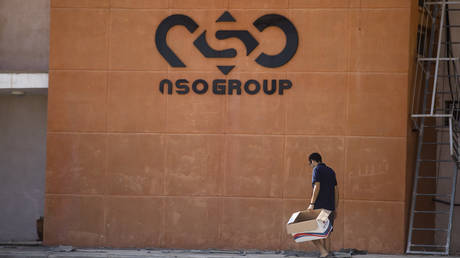A US defense contractor that tried to purchase the infamous Israeli firm behind Pegasus spyware, claimed it had the backing of the US intelligence community, the New York Times has reported. Talks are said to have collapsed after the media exposed them last month.
The report on Sunday offered new details about the bid by L3Harris to acquire the embattled Israeli firm NSO, which was blacklisted by the US Department of Commerce in November last year.
Washington imposed sanctions after years of reports that the Israeli company’s flagship product, Pegasus, was used by clients to spy on foreign officials, journalists and human-rights activists, which significantly hurt the NSO business.
According to the Times, L3Harris negotiators claimed to have the quiet backing of the US intelligence community to purchase NSO. It was supposed to help with the US approval of the deal despite the Israeli company being blacklisted. American executives made the claim while meeting Amir Eshel, the director general of the Israeli defense ministry, who would have to sign off on the proposed acquisition.
Company officers said that the US government would allow the deal to go through under certain conditions, Times sources said. They asked the NSO’s collection of ‘zero-day’ exploits and Pegasus source code to be offered to the members of the Five Eyes intelligence-sharing group, which incorporates the US, Britain, Canada, Australia and New Zealand.
The Israeli government was split on the proposal, with the Ministry of Defense supporting it and the intelligence community objecting, the report said. The military also wanted to keep authority to issue export licenses for NSO services. The Times noted that NSO was treated by Israel as a de facto “arm of the state.” The firm took on as clients those nations that the Israeli government wanted to bolster relations with, including Saudi Arabia.
The talks were first reported last month by the website Intelligence Online, with a joint report by Haaretz, The Washington Post and The Guardian partially confirming its content. The Times and Washington Post said days after the exposure the talks had been canceled, though according to the Times, “there have been attempts to resuscitate the negotiations”.
US officials told both newspapers they were not aware of any support from within the American government for the L3Harris bid to purchase NSO.
“After learning about the potential sale, the [intelligence community] did an analysis that raised concerns about the sale’s implications and informed the administration’s position,” the Times cited a source as saying.
The newspaper said questions remained “about whether parts of the US government … had seized an opportunity to try to bring control of NSO’s powerful spyware under US authority” with or without White House knowledge.
L3Harris makes billions each year from federal and state government contracts. The Pentagon is its primary source of contracts, but it has also provided services to the FBI and local police forces in the US, the Times said.
In 2018, the American firm purchased Australian spyware firm Azimuth Security. Two years prior Azimuth had helped the FBI unlock the phone of one of the San Bernardino shooters, ending the agency’s stand-off with Apple over its refusal to provide the government access to the device. The company’s role was not revealed until last year.



